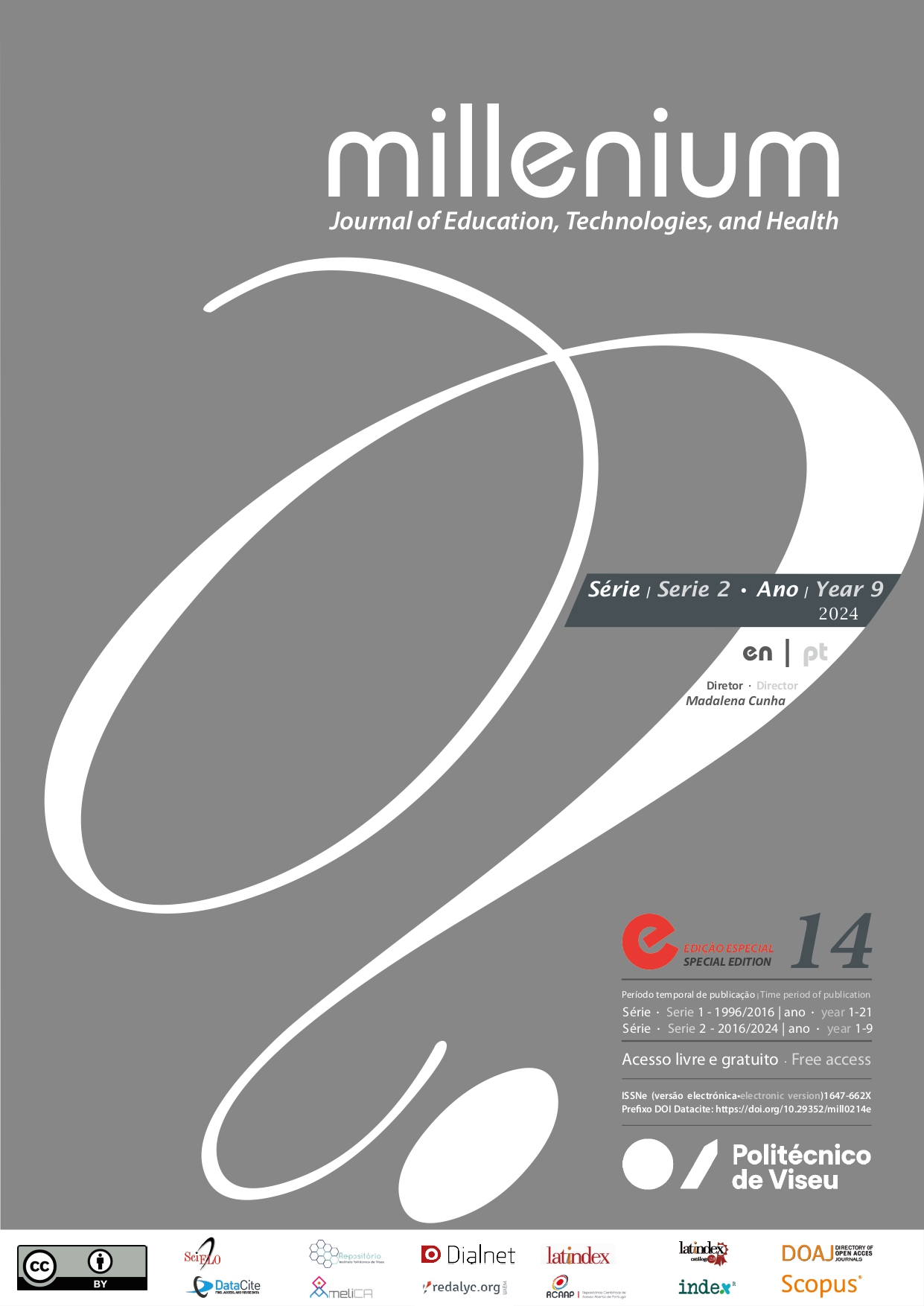Nurses' strategies in the communication with family members of people in process of organ donation: systematic review
DOI:
https://doi.org/10.29352/mill0214e.31688Keywords:
nurses; organ donation; strategies; communication; relativesAbstract
Introduction: Organ donation is a complex process that includes family members as recipients of care. This challenge requires nurses to have the skills and competences to optimize their intervention. One of the solutions seems to lie in improving the quality and effectiveness of communication between professionals and families.
Objective: To identify the strategies used by nurses in communicating with the relatives of people undergoing organ donation, with a view to more effective communication.
Methods: Systematic literature review. The search was carried out between December 2022 and February 2023 in the Scopus, Web of Science, PubMed, and B-ON databases, based on the research question "What strategies do nurses use when communicating with the relatives of people undergoing organ donation?". The search and selection process were documented using the Prisma methodology by two independent reviewers.
Results: Seven articles were retrieved for review. Communication Strategies emerge as a response to effective communication and approach to the families of people undergoing organ donation.
Conclusion: Nurses should prioritize continuity and regularity in their contact with families. Sharing should be empathetic, honest, sincere, and transparent, giving security and trust to the therapeutic relationship and enabling greater involvement. They should also be aware of the multidimensionality of communication, seeking a balance and adequacy of all elements, such as verbal and body language.
Downloads
References
Andrade, J., Brito, A., Lira, G., Fernandes, F., & Melo, R. (2018). Experiences and Strategies of an Organ Procurement Organization. Revista de Enfermagem UFPE, 12(4). https://doi.org/10.5205/1981-8963-v12i4a110257p857-864-2018
Aromataris E, & Munn Z. JBI Manual for Evidence Synthesis. JBI. https://doi.org/10.46658/JBIMES-20-02
Avilés, L., Kean, S., & Tocher, J. (2022). Edgework emotion management: A constructivist grounded theory of organ donation nurses' experiences and practices. Journal of clinical nursing, 31(23-24), 3510–3522. https://doi.org/10.1111/jocn.16179
Direção Gearal da Saúde (2019). Manual de Boas Práticas Literacia em Saúde: Capacitação dos Profissionais de Saúde, Direção de Serviços de Prevenção da Doença e Promoção da Saúde. Direção Geral de Saúde. https://www.dgs.pt/documentos-e-publicacoes/manual-de-boas-praticas-literacia-em-saude-capacitacao-dos-profissionais-de-saude-pdf.aspx
European Dialysis and Transplant Nurses Association & European Renal Care Association (2017). The Art of Communication - A Nurses Guide to Implementing Best Practice in Communication. https://www.edtnaerca.org/education/publications-en
Fernández-Alonso, V., Palacios-Ceña, D., Silva-Martín, C., & García-Pozo, A. (2021). Deceased donor care provided by the nurse transplant coordinator: A qualitative research study among Spanish nurses. International Journal of Nursing Practice, 27(3), e12905.https://doi.org/10.1111/ijn.12905
Fernández-Alonso, V., Palacios-Ceña, D., Silva-Martín, C., & García-Pozo, A. (2020). Facilitators and Barriers in the Organ Donation Process: A Qualitative Study among Nurse Transplant Coordinators. International Journal of Environmental Research and Public Health, 17(21), 7996. https://doi.org/10.3390/ijerph17217996
Figueiredo, C., Pergola-Marconato, A., & Saidel, M. (2020). Equipe de Enfermagem na Dação de Órgãos: Revisão Integrativa da Literatura. Revista Bioética, 28. https://doi.org/10.1590/1983-80422020281369
Karaman, A., & Akyolcu, N. (2019). Role of intensive care nurses on guiding patients' families/relatives to organ donation. Pakistan journal of medical sciences, 35(4), 1115–1121. https://doi.org/10.12669/pjms.35.4.1285
Kleinpell., R, Heyland., D, Lipman., J, Sprung., C, Levy., M, Mer., M, Koh., Y, Davidson., J, Taha., A, & Curtis., R. (2018). Patient and family engagement in the ICU: Report from the task force of the World Federation of Societies of Intensive and Critical Care Medicine. Journal of Critical Care, 48, 251-256.https://doi.org/10.1016/j.jcrc.2018.09.006
Mar, M.J., Esteves, N., & Sousa, A.S. (2020). Satisfação familiar em cuidados intensivos: revisão integrativa da literatura. Revista de Investigação & Inovação em Saúde, 3(1), 67-77.
Milross, L., O'Donnell, T., Bucknall, T., Pilcher, D., Poole, A., Reddi, B., & Ihle, J. (2022). Perceptions held by healthcare professionals concerning organ donation after circulatory death in an Australian intensive care unit without a local thoracic transplant service: A descriptive exploratory study. Australian critical care: official journal of the Confederation of Australian Critical Care Nurses, 35(4), 430–437. https://doi.org/10.1016/j.aucc.2021.06.013
Moraes., E, Neves., F, Santos., M, Merighi., M & Massarollo., M. (2015). Experiências e expectativas de enfermeiros no cuidado ao doador de órgãos e à sua família. Revista da Escola de Enfermagem da Universidade de São Paulo, 49(2), 129-135.
Naghavi, N., Mubarik, M. S., Rasiah, R., & Sharif Nia, H. (2020). Prioritizing Factors Affecting Deceased Organ Donation in Malaysia: Is a New Organ Donation System Required? International journal of general medicine, 13, 641–651. https://doi.org/10.2147/IJGM.S253372
Phaneuf, M. (2005). Comunicação, entrevista, relação de ajuda e validação. Lusodidacta.
Tolfo, F., Siqueira, H. C. H., Scarton, J., Cezar-Vaz, M. R., Santos, J. L. G. D., Rodrigues, S. T., & Pedroso, V. S. M. (2021). Obtaining tissues and organs: empowering actions of nurses in the light of ecosystem thinking. Revista brasileira de enfermagem, 74(2), e20200983. https://doi.org/10.1590/0034-7167-2020-0983.
Downloads
Published
How to Cite
Issue
Section
License
Copyright (c) 2024 Millenium - Journal of Education, Technologies, and Health

This work is licensed under a Creative Commons Attribution 4.0 International License.
Authors who submit proposals for this journal agree to the following terms:
a) Articles are published under the Licença Creative Commons (CC BY 4.0), in full open-access, without any cost or fees of any kind to the author or the reader;
b) The authors retain copyright and grant the journal right of first publication, allowing the free sharing of work, provided it is correctly attributed the authorship and initial publication in this journal;
c) The authors are permitted to take on additional contracts separately for non-exclusive distribution of the version of the work published in this journal (eg, post it to an institutional repository or as a book), with an acknowledgment of its initial publication in this journal;
d) Authors are permitted and encouraged to publish and distribute their work online (eg, in institutional repositories or on their website) as it can lead to productive exchanges, as well as increase the impact and citation of published work
Documents required for submission
Article template (Editable format)





